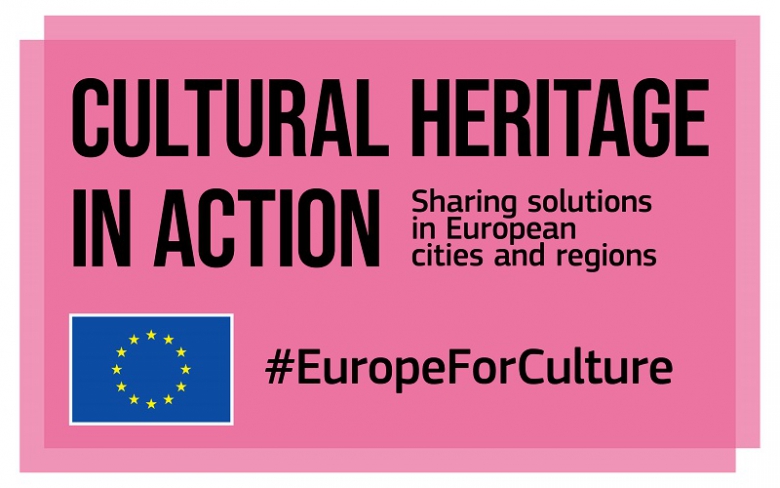First Episode of “Sharing stories webinar series”
We are excited to launch the “Sharing stories webinar series” as part of the Cultural Heritage in Action EU-funded project – of which Europa Nostra is a proud partner. This webinar series will showcase leading cultural heritage initiatives which are driving sustainable urban and regional development in European cities and regions. These have been designed to share good practices and insights on a range of topics relevant to cities, regions and cultural heritage stakeholders, including: cultural heritage policy, resilience and recovery, governance and participation, adaptive reuse, climate resilience, and social inclusion. Each episode will clearly demonstrate the opportunities for cities and regions in contributing to innovative, impactful, and sustainable cultural, environmental, social and economic territorial processes. Participants will hear from a range of inspirational examples and experienced speakers and have the opportunity to ask their questions and share their ideas.

Don’t miss the Episode 1 “Learning through, with and about cultural heritage: education, training and literacy in European cities and regions“. The webinar will take place on 28 February, from 14.00 to 15.30, fully online.
Link to register: Teams / Link to connect: Teams
Overview
This webinar will explore the interrelations between cultural heritage, education, training and literacy: how can local cultural heritage promote new learning environments and help strengthen key competences such as literacy, language, cultural awareness and engagement? How can cities and regions support learning through, with and about cultural heritage?
Transmission is an integral aspect of cultural heritage. Telling, writing and reading stories has been a common tradition all over Europe for centuries. Oral history, memories and local customs are passed on from generation to generation and have shaped communities, contributing to a strong European cultural heritage. But this European cultural heritage can also play a more social and educational role for young generations.
Raising awareness of local cultural heritage, developing competence in cultural expression, as well as promoting preservation and conservation techniques of heritage buildings, landscapes or traditions, are key in keeping Europe’s heritage alive for future generations.
Across Europe, European cities and regions are creating opportunities for young citizens to discover and engage with their cultural roots while continuously improving key competences such as literacy, multilingualism and cultural awareness. During this webinar you will discover projects that are inspirational examples of what can be achieved when education, training and youth engagement meet cultural heritage.
Featured Case-studies
• The Helsinki Culture Leap public programme for schools increased the amount of Cultural Education Plans in Finland, which ensured that all children and young people get the chance to experience their cultural heritage. Helsinki Culture Leap received a European Heritage / Europa Nostra Award in 2018. More info.
• In Leeuwarden, the Story Valley Erasmus+ project lets oral history meet with innovative and creative techniques of literacy to interpret cultural heritage stories of students using visual, audio and digital materials across disciplines. The programme is developed in a way that students strengthen their key competences in literacy and language in an engaging way of learning. More info.
• In Edinburgh, the Culture United project (also Erasmus+) is built on cultural events and heritage festivals. It is striving to embed multidisciplinary ways of teaching in primary schools. The Culture United project appeals to the interests and natural enthusiasm of children, to teach them in an interactive and engaging way. More info.
Themes and challenges to be discussed during the webinar
• Participatory approaches in cultural heritage education activities: do’s and don’ts of working with schools, teachers, students and pupils
• What are the ingredients to set-up good partnerships on cultural heritage between municipalities and educational institutions?
• How to tackle challenges of literacy, multilingualism & cultural awareness through cultural heritage projects?
• While promoting local cultural heritage, how to tackle challenges and opportunities linked to cultural education, such as engaging with schools and teachers?
• How to entrust young people in the development of cultural heritage focused activities?
• Sneak peek into the power of European funding programmes for projects around education and cultural heritage
• Learn about the EU year of youth 2022, its objectives and opportunities
Invited speakers
• Hanna Kristiina Lämsä (Finland), Executive Director of the Association of Cultural Heritage Education in Finland. In this capacity, she has managed Cultural Leap: Educational Programme (Grand Prix of the European Heritage Awards / Europa Nostra Awards in 2018). She is a member of the Selection Committee for Education, training and skills of the European Heritage Awards / Europa Nostra Awards. She holds membership of the European Heritage Days Working group and the Board of Europa Nostra Finland. Her expertise covers cultural sustainability, education and learning, youth engagement, and policymaking.
• Hester van der Werff, Senior Advisor International Affairs / project manager Municipality of Leeuwarden & Learning Hub Friesland
• David Waddell, Senior Events Officer and Lorna MacDonald, Strategic Development Officer – Creative Learning, Communities and Families, City of Edinburgh Council.
• Colleagues from the European Commission on the European Year of Youth 2022
Agenda
Webinar moderated by Cécile Houpert, Eurocities project coordinator
• General introduction to the webinar (5’), Cécile Houpert, Eurocities
• The European Year of Youth 2022, an opportunity to seize! With the European Commission (10’)
• Presentation from Leeuwarden (10’) by Hester van der Werff
• Presentation from Edinburgh (10’) by David Waddell
• Q&A session on Erasmus+ projects and cultural heritage (10’): Erasmus+ is the EU’s programme for education, training, youth and sport in Europe. How can the programme support local and regional authorities to develop cultural and educational activities together with cultural heritage and education professionals? Insights from colleagues in cities administrations running Erasmus+ projects.
• Presentation from Helsinki (10’) by Hanna Kristiina Lämsä
• Main learning points, transferability tips and things to remember (5’)
• Q&A with the audience (20’)
• Conclusion (5’)



